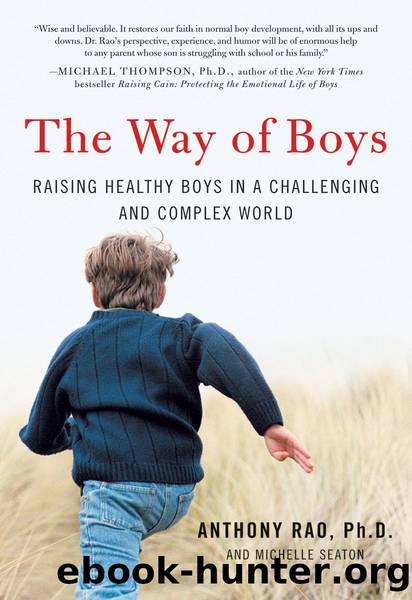The Way of Boys by Anthony Rao PhD

Author:Anthony Rao, PhD
Language: eng
Format: epub
Publisher: HarperCollins
Published: 2009-10-15T00:00:00+00:00
He Wants to Be the Best
Hand in hand with this constant challenge to learn new things is a boyâs intense need for mastery. A boy is in competition all the time, with his siblings, his peers, and even himself. He doesnât just want to learn a skill; he wants to wrestle it to the ground and own it. He wants to be the best at something right away, and when he canât because the skill is just too hard at first, he is going to be enraged or in tears. His drive to succeed is high, while his tolerance for failure is low. So he is likely to break down emotionally all through his early years of development.
This can happen easily in the classroom as well as at home. One mom I know told me that she went to her sonâs school to volunteer in the classroom. The class was doing an exercise where they were writing numbers on a piece of paper. Her son, Matthew, wrote a backward 2 and then realized his mistake. No one said anything about the mistake or even noticed it until he broke down crying. His teacher said, âItâs okay, honey; just try again.â Then Matthew became embarrassed about the fact that he was crying and just cried harder. This mom was embarrassed for her son and tried repeatedly to encourage him. She patted him on the back and whispered to him, but he shrugged her off and then cried harder. It went on for thirty minutes, and Matthew didnât actually stop crying until after his mother left the room. Later, she asked me what was wrong with him. She really wanted to know if he wasnât a good fit with the classroom. She feared that if he couldnât rebound from a simple mistake, he would be unable to keep up with his peersâeven though he was only in kindergarten.
I told her that it was not that serious. What happens with many boys is that they want to be great at every skill all the time. I reminded her that her son was one of the youngest kids in the class. He had just turned five when all the other kindergartners were several months older. Some of the boys in that classroom were nine months older than Mathew. But he didnât know that. Instead he was thinking: Iâm powerful, and I want to be the best; why canât I do this? He felt embarrassed that he couldnât perform perfectly.
Parents should understand that they can accidentally bring out the most regressive behavior in their own children, especially in a school setting. I donât mean that as an insult, but itâs true. Your child will behave much better in the classroom when youâre not there. Heâs more likely to misbehave and break down when Mom and Dad are watching. He is comfortable showing you all his vulnerability and is used to crying around you as a signal to you that he wants help. He saves his tears for you.
Download
This site does not store any files on its server. We only index and link to content provided by other sites. Please contact the content providers to delete copyright contents if any and email us, we'll remove relevant links or contents immediately.
| Early Childhood | Parenting Boys |
| Parenting Girls | School-Age Children |
| Single Parents | Teenagers |
The Lost Art of Listening by Michael P. Nichols(7487)
Rich Dad Poor Dad by Robert T. Kiyosaki(6601)
We Need to Talk by Celeste Headlee(5608)
I Love You But I Don't Trust You by Mira Kirshenbaum(3859)
The Complete Idiot's Guide to Coping With Difficult People by Arlene Uhl(3145)
Rich Dad Poor Dad: What The Rich Teach Their Kids About Money - That The Poor And Middle Class Do Not! by Robert T. Kiyosaki(2946)
A Burst of Light by Audre Lorde(2597)
The Book You Wish Your Parents Had Read (and Your Children Will Be Glad That You Did) by Philippa Perry(2503)
Dealing with People You Can't Stand by Dr. Rick Brinkman(2452)
Life Hacks by Dan Marshall(2446)
An Odyssey by Daniel Mendelsohn(2305)
The Expectant Father by Armin A. Brott & Jennifer Ash(2263)
Teach Your Child How to Think by Edward De Bono(2153)
No Time to Say Goodbye(2109)
What I Need by J. Daniels(2075)
The 7 Habits Of Highly Effective Teens by Covey Sean(2063)
The Out-of-Sync Child by Carol Stock Kranowitz(2039)
The Anxious Generation by Jonathan Haidt(2005)
I Don't Belong to You by Keke Palmer(1983)
